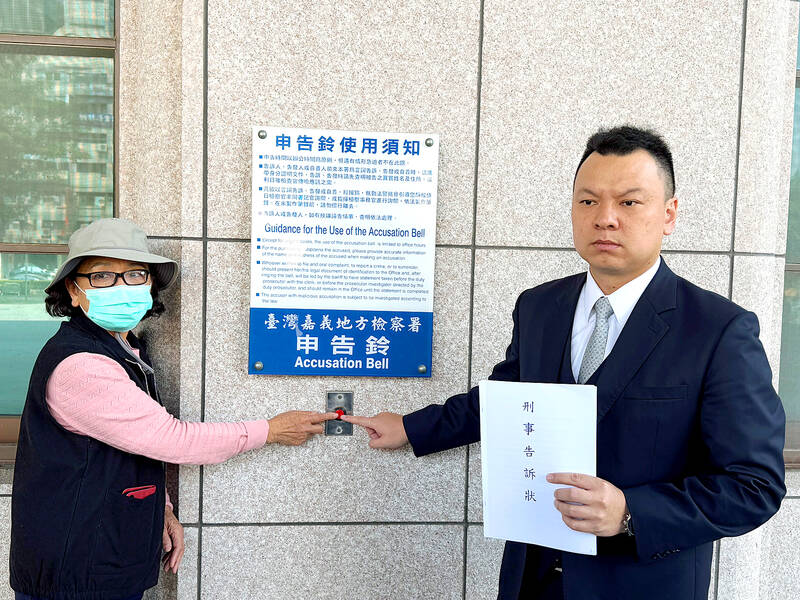The leader of efforts to recall Democratic Progressive Party (DPP) Legislator Wang Mei-hui (王美惠) yesterday said they would stop collecting signatures for the second stage of the recall drive following allegation of forgeries.
A 65-year-old surnamed Cheng (鄭) and her lawyer yesterday alleged that the leader of the recall drive, surnamed Chen (陳), had falsified Cheng’s signature.
Cheng said she received a notice of confirmation from the Central Election Commission’s (CEC) Chiayi branch that she had signed the petition, alhough she had not.

Photo: CNA
She added that she suspected her personal information had been leaked.
In response, Chen yesterday said that he only received the returned petition forms collected by “eager members of the public” and could not verify them, adding that was why he submitted hundreds more petitions than required in the first stage of the recall process so that the CEC could verify the signatures.
Falsifying people’s signatures was never an idea that crossed his mind, and he is equally annoyed, he said.
“This [fake signature] has crossed my personal red line,” he said.
After the CEC announces the result of the current phase of the recall on Tuesday next week, Chen said he would hold a separate news conference to announce that he does not intend to continue collecting signatures for the second stage.
The Public Officials Election and Recall Act (公職人員選舉罷免法) states that recalls have to undergo two stages, the first being the proposal, which requires 1 percent of voters in the electorate the official represents to sign the petition. In the second petition stage, signatures from 10 percent of voters in the electorate must be collected before a recall vote is held.
The act states that the recall vote must receive approval from one-quarter of the electorate.
Wang, who represents a constituency in Chiayi City, yesterday said that multiple incidents of forged signatures — including one reported last month of a signature belonging to a person who had passed away — showed that allegations of people copying names off existing lists, such as membership lists at party branches, held some truth, adding that she hoped all such illegal acts would be punished.

Taiwan is projected to lose a working-age population of about 6.67 million people in two waves of retirement in the coming years, as the nation confronts accelerating demographic decline and a shortage of younger workers to take their place, the Ministry of the Interior said. Taiwan experienced its largest baby boom between 1958 and 1966, when the population grew by 3.78 million, followed by a second surge of 2.89 million between 1976 and 1982, ministry data showed. In 2023, the first of those baby boom generations — those born in the late 1950s and early 1960s — began to enter retirement, triggering

ECONOMIC BOOST: Should the more than 23 million people eligible for the NT$10,000 handouts spend them the same way as in 2023, GDP could rise 0.5 percent, an official said Universal cash handouts of NT$10,000 (US$330) are to be disbursed late next month at the earliest — including to permanent residents and foreign residents married to Taiwanese — pending legislative approval, the Ministry of Finance said yesterday. The Executive Yuan yesterday approved the Special Act for Strengthening Economic, Social and National Security Resilience in Response to International Circumstances (因應國際情勢強化經濟社會及民生國安韌性特別條例). The NT$550 billion special budget includes NT$236 billion for the cash handouts, plus an additional NT$20 billion set aside as reserve funds, expected to be used to support industries. Handouts might begin one month after the bill is promulgated and would be completed within

NO CHANGE: The TRA makes clear that the US does not consider the status of Taiwan to have been determined by WWII-era documents, a former AIT deputy director said The American Institute in Taiwan’s (AIT) comments that World War-II era documents do not determine Taiwan’s political status accurately conveyed the US’ stance, the US Department of State said. An AIT spokesperson on Saturday said that a Chinese official mischaracterized World War II-era documents as stating that Taiwan was ceded to the China. The remarks from the US’ de facto embassy in Taiwan drew criticism from the Ma Ying-jeou Foundation, whose director said the comments put Taiwan in danger. The Chinese-language United Daily News yesterday reported that a US State Department spokesperson confirmed the AIT’s position. They added that the US would continue to

IMPORTANT BACKER: China seeks to expel US influence from the Indo-Pacific region and supplant Washington as the global leader, MAC Minister Chiu Chui-cheng said China is preparing for war to seize Taiwan, Mainland Affairs Council (MAC) Minister Chiu Chui-cheng (邱垂正) said in Washington on Friday, warning that Taiwan’s fall would trigger a regional “domino effect” endangering US security. In a speech titled “Maintaining the Peaceful and Stable Status Quo Across the Taiwan Strait is in Line with the Shared Interests of Taiwan and the United States,” Chiu said Taiwan’s strategic importance is “closely tied” to US interests. Geopolitically, Taiwan sits in a “core position” in the first island chain — an arc stretching from Japan, through Taiwan and the Philippines, to Borneo, which is shared by